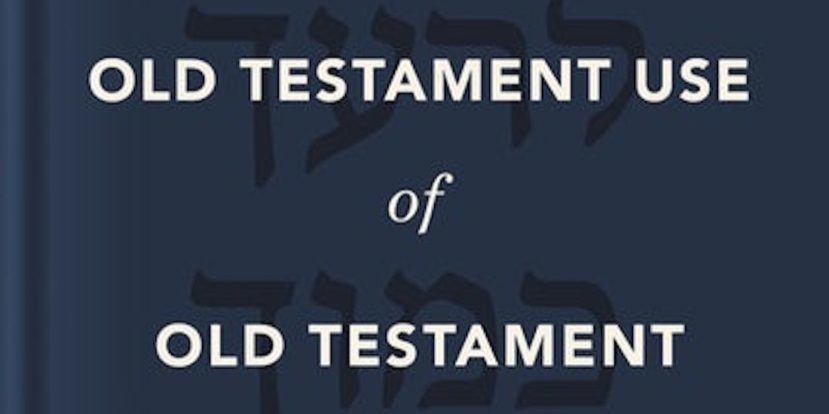
Surprises of Old Testament Use of Old Testament: Part 1
This post initiates a series of surprises that came out of researching and writing a reference work for students and ministers of the word on the use of scripture within Israel’s scriptures entitled Old Testament Use of Old Testament.[i] This project surprised me by helping me to realize how complex progressive revelation is.
Unexpected Observation One:
The Complexity of Progressive Revelation
Moderns do not get it. The availability of information and proliferation of gadgets skews expectations. People expect to hover over terms like “quantum mechanics” and see what it all means between sips of a European blend.
My seminary students do not feel like I have taught until complicated sets of profound truths have been boiled down into an easy-to-remember short snippet. Many congregants await the sermon’s pithy motto that can fit in a tweet as a sign that the preacher has preached.
Modern citizens do not get the progressive revelation of Yahweh’s redemptive will. They might say, “Why doesn’t he just say it all at once?” And even after someone explains it, they still think, ‘He should just say it. Boom. Done.’ Yahweh is not a modern American.
As a seminary student I remember hearing and reading—in literature on both sides of the theological aisle—the commonplace use of the image of a tree as a way to explain progressive revelation. One memorable version says, “The line of revelation is like the stem of those trees that grow in rings. Each successive ring has grown out of the preceding one.”[ii] This image rightly gets at continuity and coherence emphasized by an organic view of revelation.
My work evaluating hundreds of cases of scriptural exegesis within the Old Testament confirms the value of the image of the tree. But the great variety and the dynamics of progressive revelation in the Old Testament do not fit as comfortably with a tree that stays in one place for a century.
Other images can complement revelation-like-a-tree. In Calvin’s view, revelation is accommodated to what may be handled at a given time. Calvin uses the way ancients had less insight to explain why the Old Testament meets ancient Israel in more primitive ways of thinking.[iii]
These individual-oriented models, of a tree or of mental aptitude, do not fully get at massive collective changes in the identity of Israel from slaves to wanderers to competing kingdoms to captives to those who return to provincial life in their ancestors’ homeland. The scrolls of the Old Testament span over a thousand years across many ancient Mediterranean and Mesopotamian lands. Many of these realities are messy and do not move forward in a straight line. But there is more.
Yahweh’s organic revelation by his delegates comes in many scrolls representing many genres. Vos recognizes the variety and how it relates to progressive revelation when he explains it in broad brush strokes. He says that in various biblical genres—like legal, prophetic, and poetic—“we witness a striking multiformity of teaching employed for the same purpose.”[iv] The scope of my research on exegetical advances of revelation in every scroll of the Old Testament affirms Vos’ point. It also suggests the next step.
Book by Book
The subset of progressive revelation housed in the Bible’s use of the Bible requires attention book by book. More than genres, every scroll of the Old Testament needs to be approached in its own right and according to its own context. There are broad patterns of kindred tendencies within the way Old Testament prophets and narrators use scripture, to be sure. But Hosea and Isaiah and Ezekiel and Malachi go about exegesis of Torah in their own ways. And, trying to push a cookie-cutter approach onto the variety of narratives’ and psalms’ use of scripture would do more damage than anything else.The subset of progressive revelation housed in the Bible’s use of the Bible requires attention book by book. Click To Tweet
Because of limitations one example can be used here to illustrate the variety of progressive revelation by means of exegetical advancements within the Old Testament. Only the punchlines need to be presented since these are explained in detail elsewhere.[v] The attribute formula in Exodus 34:6–7 gets recycled and recast repeatedly by exegetical allusions throughout the Old Testament. It is important to start by noticing that the attribute formula itself offers an exegetical advancement of the second commandment (emphases signify verbal parallels in Hebrew).
You shall not bow down to them or serve them; for I, Yahweh your God, am a jealous God, punishing the iniquity of the parents upon the children to the third and fourth generation of those who hate me, but showing loyalty to thousands of those who love me and keep my commandments (Exod 20:5–6 lit.).
And he passed in front of Moses, calling out, “Yahweh, Yahweh, a God compassionate and gracious, slow to anger, abounding in loyalty and faithfulness, 7 maintaining loyalty to thousands, and forgiving iniquity, transgression, and sin. Yet he does not leave the guilty unpunished; punishing the iniquity of the parents upon the children and upon the grandchildren to the third and fourth generation” (34:6–7 lit.).
How Yahweh responds to the rebel and to the one who repents—whether Israel or the other—signifies what kind of God he is.
In the immediate context of the attribute formula, Moses strenuously emphasizes that Yahweh’s self-identification as “a compassionate and gracious God” does not in any way diminish his jealous character in dealing with wayward Israel. Moses goes so far as to say that his very name is “Jealous.”[vi] Elsewhere Moses re-emphasizes that Yahweh’s is slow to anger, and demonstrates his fidelity by the way he brings judgment upon those who hate him (literally “to their faces”).[vii] All of these exegetical advancements of revelation pivot on who Yahweh is (underlining signifies verbal parallels in Hebrew and bold signifies exegetical advances).
I, Yahweh your God, am a jealous God (Exod 20:5//Deut 5:9 lit.).
Yahweh, Yahweh, a compassionate and gracious God (Exod 34:6 lit.).
Yahweh whose name is Jealous, he is a jealous God (34:14 lit.).
Yahweh your God, he is God, the faithful God (Deut 7:9 lit.).
Who Yahweh is offers hope to the repentant and to the Yahweh-lover. Who Yahweh is should bring dread upon rebels and Yahweh-haters. Outside of Torah the prophets, the psalmists, and other biblical writers frequently reinterpret the attribute formula.[viii] For all of the multiformity of this stream of Yahweh’s revelatory advancements by scriptural exegesis, it is simple. It is who he is.
In sum, the complexity of progressive revelation within scripture surprised me. Progressive revelation by the Bible’s interpretation of the Bible is not a good fit for moderns who prefer sound bytes and pithy mantras. If the serious problems of today require serious answers, these may include a reexamination of the manifold exegetical advancements within the Old Testament. The exegetical advances may not always go in a straight line or match up to readerly expectations. But they bring to light the progressive revelation of Yahweh’s will that culminates in the gospel of Messiah.
Sometimes Yahweh’s will does not fit in a tweet.
Footnotes
[i] See Gary Edward Schnittjer, Old Testament Use of Old Testament (Grand Rapids: Zondervan Academic, at press).
[ii] Geerhardus Vos, “Inaugural Address,” in Inauguration of the Rev. Geerhardus Vos, Ph.D., D.D., as Professor of Biblical Theology (New York: Anson D. F. Randolph & Company, 1894), 39.
[iii] E.g., John Calvin, Commentaries on the First Book of Moses called Genesis, trans John King (Grand Rapids: Eerdmans, 1948), 86–87 (on Gen 1:16), et passim.
[iv] Vos, “Inaugural Address,” 21. Also see 22–24.
[v] See Schnittjer, OT Use of OT, ad loc, see esp. attribute formula network in chap. 37.
[vi] See Exod 34:14.
[vii] See Num 14:18; Deut 7:9–10.
[viii] See, e.g., Joel 2:13; Jonah 4:2; Pss 86:15; 103:8; 145:8; cf. Nah 1:2–3.

